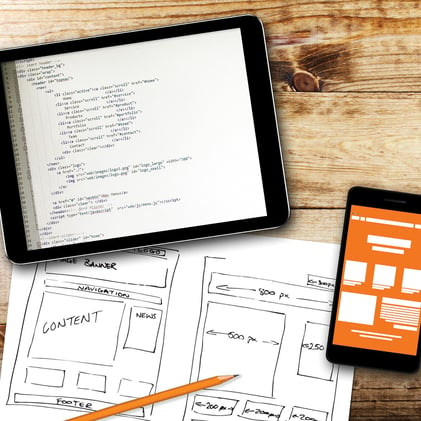HOW TO PICK THE RIGHT WEB DEVELOPMENT PARTNER
As Thread’s Senior Vice President of Communications Technology, I have been helping clients develop custom websites for over 15 years and, therefore helpful advice that will save you time and money when seeking a web development partner.
Over my years of experience, I have heard many horror stories from clients when the development process goes wrong. Most people don’t realize that the most important steps are the ones you take before you even choose a web partner.

The first step is to pick an internal project manager on your team who can provide direction and approvals for your business needs. Most companies are made up of diverse types of people who are all going to have various requests for the website. The project manager will be the single point of contact who will help organize all those requests and help you decide what you really need versus what people want or think is “cool.” The opposite approach – having multiple people giving direction to your web partner – is a recipe for disaster.
The next step is to develop and finalize your budget. If you don’t have a final budget that has been approved, a lot of time can be wasted. It’s important to begin with the right mindset: Building a website is a lot like building a house, everything you add on is going to increase your price. Decide upfront what is needed to support your business strategy, not what might be trendy, cool or fun.
Now it’s time to have your project manager draft an outline of every section you want on the website and any functionality that will be required for your business. Usually, functionality is defined as anything that is not static content pages (e.g., blog, event calendar, importing data from other internal systems). The outline should be as detailed as possible for your web development partner to determine accurate pricing.
Strategic and thoughtful planning is the most important part of the process. It will help you avoid additional development costs that could take your project out of scope from the original estimate the vendor provided. During this process, make sure to look at your competitors online because this is what your end customer will do. Make sure you are developing a website that will allow you to compete in your market.
Once you have a leader, a budget and a plan – NOW you are ready to find a partner to help you develop the website. There are many web development companies and some are reputable, proven companies and others just look like they are. The key is to ask the right questions, such as:
- Do you have experience developing website’s similar to what we have outlined? Please show us some examples.
- If your website needs to be ecommerce – see my next blog post. 😊
- How long have you been in business and doing this type of work? I see this problem all the time. Clients come to us because their programmer or development company is unreachable and the client has no clue what to do.
- If you develop my website, does my company own the code, or do you? Many development companies lock you into proprietary software to hold you hostage from leaving them and continually increase the cost of the site over time. Think of it like renting an apartment, you pay and pay, but you never own anything.
- Do you develop with a mobile-first approach? Web traffic on mobile devices is continually outpacing desktops. Your website must be optimized for mobile traffic.
- Do you have an IT and programming staff or do you outsource all the work? If they outsource all the IT and programming and just do the design, run as fast as you can!
- Do you host websites? If they don’t, this is another potential headache you will have to deal with. If you don’t host with the company that developed the website, it will cost you more in the long run because it will take more time for the developers to update the site.
- Where do you host websites?
- Who manages the hosting?
- How is back-up and recovery managed?
- Do you provide a beta website? Every website should have at least two versions, a beta where it is being developed and is not public facing and also a live production site. You don’t want programming being done on the live site. It should always be done on a beta site first, tested and then moved to the live production site when it is approved.
- Explain your planning and development process to us? The company should be reviewing your plan and helping you finalize it. They should guide you at this point and work with your project manager directly to keep everything moving on time and on budget.
- What type of software do you develop in and why do you feel that would be the best for my project?
- Do you provide search engine optimization services?
- Do you provide detailed analytical reports on site traffic, goal conversions and growth?
- Will you analyze those reports and make recommendations to me on how to improve my website?
- Do you have contracts I have to sign and be locked into?
- What are the payment terms and conditions?
- How will you handle long-term support and updates to the website once the website is live?
I’m sure you will come up with more of your own questions as you go through the process. Getting the right website requires a lot of hard work and planning. More than a decade of experience says: If you invest in the fundamentals, the rest of the steps are a lot easier. Feel free to connect with us if you have questions about picking the right web development partner!

